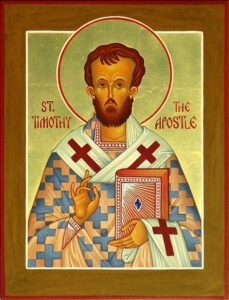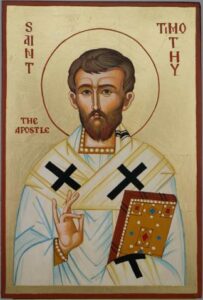St. Timothy – Jan 22 I Beloved Faithful Disciple of the Lord, Devoted and Full of Zeal for Christ

St. Timothy (Gk: Timótheos, meaning ‘honouring God, honoured by God, precious to God’, all of which was true to this disciple of the Lord. He was part of the early Church, an early Christian evangelist too. Timothy was a close companion and messenger of Paul the Apostle, as well as the first Christian bishop of Ephesus. The Church also honors St Timothy as one of the Apostles of the Seventy.
St. Timothy was born in Lystra in Lycaonia, around AD 17, in present day Turkey to a pagan Greek father and a Jewish mother. His mother Eunice, later, became a Jewish Christian (Acts 16: 1, 2 Tim. 1: 5) and his grandmother Lois, brought him up in piety and love of the Scriptures (2 Tim. 3: 14-15). Thus, the sincere trust in the Lord, was modelled and imparted to him in his childhood. Apostle Paul converted the two women during his first missionary visit to Lystra (Acts 14). On his return seven years later, he found Timothy full of zeal for Christ, very much esteemed by the local Christians. Timothy may have heard Paul’s proclamation of the gospel, about the Savior during Paul’s first missionary journey (Acts 14: 6), to bring Timothy to a saving knowledge of the truth. Timothy grew up in an environment that was distinctively Christian character forming.

St. Timothy was a timid, by nature reserved, affectionate young man, and a faithful follower of St. Paul. Paul called him as his ‘dear and faithful child in the Lord’ (my dearly beloved son)1 Cor. 4: 17; 1 Tim. 1: 2). Timothy appears to have been entirely at Paul’s disposal from Paul’s visit to Lystra on the Second Journey until the time of Paul’s death in Rome, a period of perhaps 17 years. Paul nevertheless commissioned Timothy to strengthen and encourage the resistant, recalcitrant Corinthians in their faith in Christ and in their loyalty to Paul.
Timothy’s dedication and his work for the Lord, had won the admiration of the Christians in his hometown of Lystra and in the larger city of Iconium. Timothy had developed sufficient leadership potential and several Church members both in the Lystra and in Iconium, recommended Timothy for the service of the Lord. Paul was impressed by several character qualities in Timothy, including his knowledge of Judaism and the Hebrew Scriptures, his Gentile connections through his Greek father. Timothy’s reputation as a devout Christian, convinced Paul, that it was worth his time and effort to mentor Timothy. St Paul calls and chooses Timothy to preach the Gospel, in the synagogues. St Paul personally circumcised and baptized Timothy and asked to join him, in spreading the Gospel on his missionary journeys.

Thus, Timothy became Paul’s closest disciple and one of Paul’s trusted partners. The Bible records, after Timothy was ordained to serve (1 Tim. 4: 14, 2 Tim. 1: 6), he ministered in at least five New Testament Churches (1 Thess. 3: 1 – 2, 1 Cor. 4: 17, Phil. 2: 19 – 22, Acts 17: 14 and 1 Tim. 1: 3), as an associate co-worker and helper of St. Paul. Timothy accompanied Paul on most of his second journey travels, after he left Lystra. Scripture then informs us, that he was with the apostle in Ephesus during his third missionary journey. While in the city, he and a man named Erastus are sent by Paul to minister to brethren in Macedonia (Acts 19:22). Later on, he meets with others, at Troas to accompany the apostle through Asia on his way to Jerusalem (Acts 20: 4 – 5). Timothy was an active, faithful member of the missionary team. Timothy joined Paul and Silas in telling Jesus’ followers what the apostles and other leaders in Jerusalem had decided at the recent conference (Acts 15: 19-20; 16: 4). As a result of the witness of the trio, Paul, Silas, and Timothy gave, the Churches grew stronger in their faith. Each day, more people trusted in Jesus for salvation (Acts 16: 5).
The seed of faith, planted in St Timothy’s soul by the St Paul, brought forth abundant and aplenty fruit, that he became Paul’s disciple, and his constant companion and co-worker in the preaching of the Gospel. The Apostle Paul loved Timothy and, in his Epistles, called him his beloved son, remembering his devotion and fidelity with gratitude. Timothy is associated with St. Paul in the prescripts of at least four of the apostle’s letters (1 Thess. 1: 1; 2 Cor. 1: 1; Phil. 1: 1, Philem. 1 cf; Rom. 16: 21; 2 Thess. 1: 1 Col. 1: 1). This is an indication of the extent of their joint endeavours. He is mentioned 28 times in the New Testament. St. Timothy is the co-writer of Thessalonians, 2 Corinthians, Philippians, Colossians, and Philemon.

St. Paul great love for Timothy resulted in two letters in the New Testament were written as letters from Paul to Timothy, 1st and 2nd Timothy. Paul gave Timothy a sacred trust to keep the gospel pure from contamination. Timothy’s spiritual life and ministry were his continual concern. As a result of giving himself wholeheartedly to the Savior and His work, others recognized Timothy’s progress in the faith. Timothy was careful about how he lived and what he taught. As a “man of God” (1 Tim. 6:11), Timothy was owned by and yielded to the Lord. Paul prayed for Timothy night and day (2 Tim. 1: 3).
Timothy’s life was centered on a ministry of discipleship and he matured as a unique disciple with distinctive character qualities, mainly simple purity of faith. Timothy was effective in ministry because he remained committed to the gospel and served the Church in an unselfish manner. Timothy remained faithful to his pastoral call and duties and entrusted the Lord with his temporal and eternal future. Timothy’s relationship with Paul was characterized by mutual respect and trust, and with the Churches with commitment and compassion. Timothy was careful to set a good example, and God’s power and love in Timothy’s life enabled him to be fearless in Christian service.

He could have been ordained as a priest by St Paul and eventually became the first Bishop of Ephesus, a thriving city of the Roman Empire. He became a disciple and exarch of St John the Evangelist, who supervised all the Churches in Asia. St. John Damascene, in 675 A.D. wrote that St. Timothy and St. John, the beloved disciple, were witnesses to Mary’s Assumption. Early tradition suggests that St. Timothy was with St. Paul, when the later suffered martyrdom for his unwavering confession of Christ. St. Timothy, then returned to Ephesus and in AD 97, he attempted to oppose the celebration of a festival to Artemis; by telling the crowd of pagans that their idolatrous celebrations were ridiculous. The pagans, enraged, mobbed him and beat him to death. He was buried near the tomb of St John. St. Timothy is commemorated on Jan 22 in the Orthodox Churches and Jan 26 by other Churches.

1 Comment
Varghese C Pothen · January 23, 2023 at 9:26 am
Very informative narration of St. Timothy.